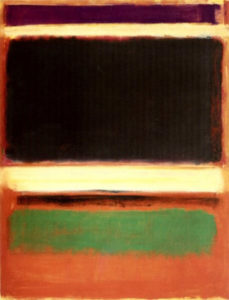 If you have ever created anything more complex than a stick figure, you have probably been asked this common question, “How long did it take to paint that?”
If you have ever created anything more complex than a stick figure, you have probably been asked this common question, “How long did it take to paint that?”
This seemingly simple question can actually be complex for the artist to answer. For me, each painting seems to have a mind of its own, with its own personality. Literally, some paintings paint themselves, while others are a slow, and more labor intensive. Self-employed artists work hard, but we are lucky; we don’t have to punch a time clock. I have never recorded the time spent on one single painting.
In a world that is moving faster and faster with instant gratification at our fingertips, many art buyers are still accustomed to equating the worth of your product by calculating the time spent on creating it. It seems logical, for if you have spent months in the studio laboring on a single painting, shouldn’t that painting be worth more than the little plein air study you spontaneously painted while spending only an hour in the field?
The truth is this, ART in all its forms including writing, poetry, sculpture, painting, music, design, photographing, and more is an accumulation of knowledge. Each painting, novel, poem or photograph is the embodiment of the artist’s lifelong experiences, emotions, education, and intuition. For me, how long did it take, can be easily encapsulated, calculated and condensed into a simple answer…
This is what I say, “A lifetime, this painting took a lifetime to paint.” ~Lori
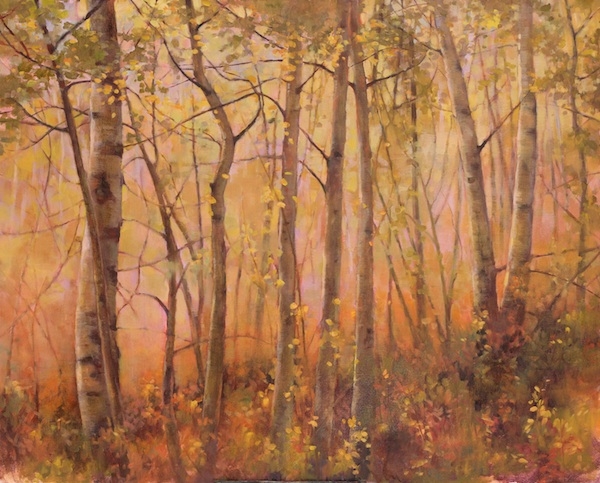
(“Aspen Dance” ©2011 LMcNee)
***What do you say when you are asked this question? Please share your thoughts in the comment section. Oh, it would be great to meet on Twitter and Facebook and Google Plus! ~Lori (If you want to see what I paint, please check out my paintings)
Here are a few other helpful articles:
7 Ways to Make Selling Art More Fun
Pricing Your Art
Advice for Selling More Art Online
Helpful Ways to Negotiate and Set Your Art Prices
A Day in the Life of Lori McNee
Balancing Parenthood and Your Art Career


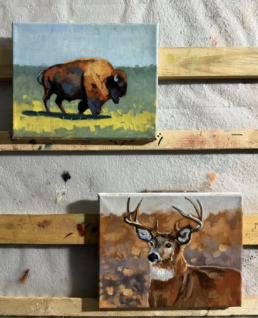

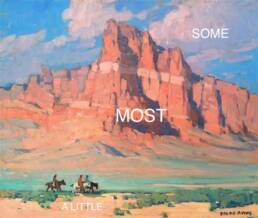
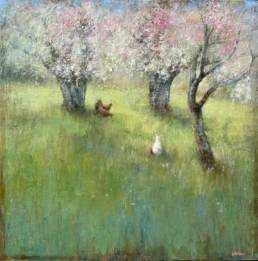
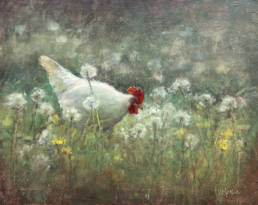
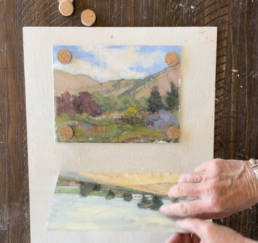
The best response! Thanks! We truly do live in an age of expected (but not forthcoming) instant gratification that has accelerated time lines due to technology. It helps to counter the cultural expecation that the few seconds needed to e-mail or text means that the actions required to respond must also only need seconds. Keep on educating the world!
“A Lifetime” – fantastic answer. I think it totally outdoes the answer that offers the number of years an artist has been painting. A Lifetime. Excellent.
Hi Jim,
Lol…I am glad you like that answer! it really is the truth 🙂
Best-
Lori
The funny thing is that my favorite pieces seem to come together quickly and easily. The ones that are a struggle from the beginning may never work no matter how much time I invest. So more time doesn’t guarantee better work.
I recently wrote a blog post with my answer to the question of “How Long Did It Take You To Paint That?” http://lucindahowe.com/2011/10/how-long-did-it-take-you-to-paint-that/
Hi Lucinda,
Thanks for sharing your thoughts…and I totally agree with you! The ones that seem effortless are often the best works. I will check out your post.
Best-
Lori
Does that include time spent pondering what step to do next? If so many hours in excess of actual painting and completion time. Abstract/ realist/ modern/ etc.? What concept am I trying to achieve? What medium? What colors will I combine? What tools to use to achieve a particular effect? What size for that matter? Hours and hours and hours…. for some,…other just flow onto the canvas.
Thanks for adding to this post with your insightful comment Shawn.
Lori 🙂
What a great answer! I make quilts and I never can keep track of the time it takes. Actual sewing time is sometimes less than the planning and choosing fabrics. Probably been 30 years or more since I have done painting, but now I have been doing some digital art for fabric for Spoonflower.
I have to come back when I have more time and read more. You seem to be talented in more than just art. Your paintings are lovely.
Lori—thanks for writing and sharing this. I don’t think most people stop to think of the lifetime of experience that is brought to bear on all we do. Great job, as usual!
Hi Terri!
I am so behind on everything lately!!! What a nice surprise to see your comment on my blog – thanks! I am glad you enjoyed this little post.
Cheers-
Lori
I’m so often thinking about art, absorbing it, reading about it and working on idea’s in my head. How do you calculate thinking time? When I begin a painting I have the idea already played out, and though I might change direction once I begin, that just starts the process all over again. A quick piece is, without a doubt, a reflection of your accumulated skill and creative mindset.
Yes, ‘thinking’ is the biggest part of my creating. I don’t have a lot of time to spend in the studio each day, so I do a lot of my problem solving and creating in my head before I get infront of the easel. Thanks for adding to this comment thread Rebecca 🙂
Lori
That’s the perfect answer. I find when I paint semi abstracts it takes less time than when i focus on realism.
Yet we all draw on our lifetime of experiences when painting. Thanks for sharing this.
Hello Nicole,
I have been painting some abstracts lately and find them harder to paint than my realistic subjects! It might look like I am slopping paint around, but there is a method to the madness…and a lot of thought and experience goes into each mark.
Best to you!
Lori
When asked, “How long did it take for you to paint that Painting? “, I usually say, “3 hours, and 40 years!” even though I’ve been painting for 65 years! It’s priceless to see the quizzical look on the face.
Great answer Dennis! Humor is a great way of diffusing that hard-to-answer question. Thanks for your tip!
PS. It is great to have you visit my blog…thanks for taking time to comment. I would welcome a guest post from you anytime…and of course, I’d link to you 🙂
Cheers-
Lori
The question is always simple.
This is the answer…but they are never this interested. All they want to know is the brush/paint to canvas time.
For me it’s: A life-time of absorbing images,colour combinations, brush-strokes….almost as much time mentally planning that work of art…..hours/days finding the right sized canvas and drawing out the diagram…hours/days/weeks/months painting it…and the rest of my life marketing it. Perhaps?
Hi Phil,
You and I are in agreement! It is amazing how this common question can generate such a big response. Thank you for your thoughts and for visiting this blog.
Happy painting-
Lori
nice thought, it’s a really important question
Sometimes, I think people ask to equate value but other times, I think they are just trying to ask a polite question. Lots of time, even if they like a painting, viewer’s don’t seem to know what to say to the artist – so much art is made out be unapproachable.
Either way, great answer Lori for the question I’m asked all the time. I think about compositions and colors sometimes for years before being inspired to start, thought when it comes to the actual painting, I’m relatively fast, even for a watercolorists – saying the actual painting time feels like it does not represent my actual effort. At least its a better question than “where do you buy your frames?”
Hello David,
Thank you for sharing this important perspective. Yes, of course…many people are sincere in their asking of this question. I am glad you enjoyed this post.
Best-
Lori 🙂
A Story about “equating value”
Once upon a time — opening night of my first one person show.
The opening went well in terms of fun with many friends and some pieces sold — which of course was nice — but most importantly it was a great time and the fun continued onto an after party at a friends house. During the get together my host handed me the phone saying a pal of hers who had been at the opening wanted to talk to me. This is how the conversation went:
“Hi – I was interested in buying the large painting of rocking chairs – I was wondering how long it took you to paint and also if we could make a deal?”
I think I had always wanted to be asked such a question.
I told the gentleman:
First this is a little early for deals — the show will hang for a month and it wouldn’t be right for me to sell behind the gallery’s back.
Secondly let me explain time and value separate from my investment in trying to learn to paint my way for over twenty years.
This painting probably was over forty hours, the gallery will take half — so if you do the math, I could mow lawns for a living and make better wages.
And I have, but I still paint — that is where the value really is…
Hello Jack…thanks for sharing your story with us. It is good you were well prepared for that question! It is also great that you value your important relationship with your gallery. Meanwhile, I hope your painting found a good home.
Bravo-
Lori
Lori I love your answer of what you tell people! Because it’s true, it has taken you all these years to acquire skills and experience, why shouldn’t that be included into the equation? I love the thinking. Thank you for making me think of this question differently.
I was also relieved to hear you say you don’t keep a time log for your work! I have kept watch and recorded a few times, but honestly I always forget and it’s boring to me. When people ask me, I know they’re wondering how many hours/days/weeks/etc, so usually I just give them a ballpark of what it usually takes me. But now I’ll have to think of a more clever answer, thanks to you. 🙂 (On Twitter: @AllisonBrattArt)
I don’t know all the proper terminology re art but I know what I like –my favorites here are the Dancing Aspens and the one with the chicadee perched on a stack of books. Tom Hawk, a musician, shared your link with me on Facebook. I love the light, the soft colors, the deep sense of relaxation one feels if able to take the time to just sort of melt into the scenes you paint. Don’t know if you ever heard of him but I used to work with the former wife of Greg Harris – some of his work was pictured in Fine Arts magazine. He used the soft colors that you do but his scenes (featuring his wife as his subject) were more- I want to say Renaissance but not sure if that’s the right term.
Thanks for the thoughtful post Lori. I agree that people are usually just curious, and then some interested buyers want to compute the price per hour. 🙂
I enjoy receiving your email newsletter and look forward to more great articles! Happy painting!
Hello Cheryl,
Thanks for taking time to let me know that you enjoyed this article and my newsletter. I appreciate your support!
Happy New Year and happy painting to you too!
Lori
I usually just say, “I don’t know. I’m not sure it’s finished yet.”
Great answer Lori! I had never thought about it that way. Get that question a lot from people and have tried to keep track of how long it dose take me to work on a piece. In the end for me it is more about painting and finishing the piece than how long it takes me to do it. I have a full time job so the only time I have to work on my art is either when I get home or on the weekends and sometimes it is just the weekends. I didn’t know that galleries priced art by the amount of time spent on it. Guess I should take more time to paint my art so it will be worth more. LOL!
Hello Mark, it has taken me a while to find the right answer to that question…but, that one really works! It also educates the curious person a bit. Galleries decided upon painting prices in many ways – measuring the time of execution is probably the least popular way…but it does happen.
Cheers-
Lori
It’s such a basic question, yet an equally revealing and important question, as well. How one answers depends largely on where one is in their art career; but, I’d venture to say what’s really noteworthy is that gallery representatives and certain customers are aware of this, as well. A customer wanting to begin a conversation to negotiate a price may ask such a question, or an artist representative looking for new clients may ask the question as a feeler question. An answer like the one you suggested, “…it took a lifetime to paint,” is about as clever and creative of a response as you can get. Great article and thanks for the read!
Hello Guy, it is such a basic question. But, wow…it sure is a loaded one! Thanks for enjoying it enough to comment. I’m glad you like my answer 🙂
Lori
I am a writer and it is exactly the same….I believe that the more experienced I get, the faster I can work- but that is only because I have gained more confidence and knowledge with each project. Also I agree with what many here have said- just as some paintings seem to paint themselves and others seem to never come together, sometimes the right words just fall onto the page and other times I agonize for ages over a single scene. 🙂
Catrina, yes writing and painting both take the same type of inspiration. Miles of canvas or rolls of paper that are left in our wake build our confidence. But, I still have moments where that blank canvas or page stares back at me – lol!
Thanks for being here,
Lori
My answer ” The whole time”.
That’s a great answer! Simple and true.
Thanks for stopping by Suzanne,
Lori
I don’t know if I like that. I’ve heard “A Lifetime” as a response before and it sounds too pretentious and dismissive. I suppose if you can deliver the line with a bit of a wink to it, maybe it’s better. Most people who ask are genuinely interested in the answer, so I answer as truthfully as I can. I am a pretty rapid plein air painter at times, so the painting is that much more impressive after knowing the fact.
If someone is interested in the painting or drawing, they are going to want to buy it based on the strength of the painting itself, not the time spent. They are “paying for the feeling” not the time. It’s a painting after all, not a parking meter.
My inspirational watercolor teacher back when I was 19 years old answered, ” A couple of days and 60 years”. That about explained it for me! I now try to do the same.
That’s a new one for me! I like it…thanks 🙂
Love your answer. After all, the years spent painting do reflect in every painting no matter how quickly it is executed!
Hi Grace, glad you liked my answer 🙂
I get asked that question often. My usual reply is that I really get lost in my work and don’t really keep track of the time, which is true. I have never really tried. However, it is a fair question, and I have to admit, I am sometimes curious as well when I view certain works of art.
So with that said, I love your answer! As long as there is not a copyright attached to it, I just might have to steal it! 🙂
Hi Steve, glad my answer inspired you! It has worked for me, and gets the people thinking. Thanks for the visit and comment.
A painter is best not to spend all there time painting, painting is just the final part of the process and its the ideas that would go into it when not painting that make a difference.
Its interesting there’s a Rothko at the top….didn’t he say his paintings took him 35 years (or however old he was when he said this?)….as his paintings do look like they are quick, but they aren’t, he’s actually paint many layers, there’s lots of blending-that takes time, then each layer has to dry, he’d do this over 20 times sometimes which kind of suggests that the painting wouldn’t be finished for about 3 months with oil paints. Of course it may only be a few hours before he’d have to stop, but he’d spend a lot of time just staring at the painting, it required it. And probably worked on another whilst that was drying.
*and to anyone who doesn’t like rothko, see them in person before you make up your mind, there’s a lot in there, and a lot that’s more related to previous representational movements, a lot more complexity going on in these simple shapes that appear like just simple shapes in a book- they basically don’t work in print!.
but maybe the quick painter have a better business mind…if you could knock out 10 a day then you probably have more revenue right there compared to a few expensive intricate paintings a year. Its a question of whether you want to be intricate for the sake of it, does it require it, likewise are you being quick for the sake of it which i see just as much- do whatever’s needed.
Thanks for sharing your thoughts. I haven’t heard that story about Rothko, but I like it and enjoyed learning more about his process! Rothko’s works look so simple, yet I know how difficult simplicity can be. I am inspired by his color fields and incorporate his ideas into my own works at times.
In my book, quick isn’t better. ~Lori
The answer “A lifetime” or “All my life up until now” is a popular answer for all artists. But, the thrust of the answer is not much different from a similar response from any person serious about their profession. A master carpenter has spent his life honing his skills as had a scientist, engineer, architect, skilled business person, or experienced attorney. All of them place a specific value on their time. I don’t know an all-encompassing answer to the question. What I do know is that based on each individual’s concept of beauty or meaning, true quality in a work of art is instantly recognized and appreciated. The value of that appreciation varies and is timeless.
Wonderful thoughts Gary! Thanks for sharing your answer to that question here.